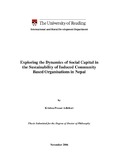Please use this identifier to cite or link to this item:
http://archive.nnl.gov.np:8080/handle/123456789/113| Title: | Exploring the dynamics of social capital in the sustainability of induced community based organisations in Nepal |
| Authors: | Adhikari, Krishna Prasad |
| Keywords: | Community Based Organisations--Nepal |
| Issue Date: | 10-May-2018 |
| Abstract: | There has been since 1990 a massive rise in the inducement of community based organisations (CBOs) by development agencies in Nepal. However, there is a lack of knowledge about the prevalence, the level of sustainability and factors contributing to the sustainability of CBOs. Through an investigation of the role of social capital, this study aims to address these issues and contribute to greater understanding of the sustainability of CBOs in Nepal. Field research conducted in Nepal in 2004/2005 involved collection and analysis of quantitative and qualitative data from two level: micro and macro, and for three units of analysis: individual, group and village. Using semi-structured interview, group discussion, document analysis and observation through exploratory and in depth study, information was gathered from 94 households and 129 CBOs from 14 villages of two VDCs in Southern Nepal. Macro level data were collected through a survey with 39 leading community mobilising agencies in Nepal. The study shows that group inducement is rising fast, but the sustainability aspect has been an ignored dimension. Findings show a general tendency in the dynamics of groups to shrink in membership, activities, participation and resources over the time period of their existence. Although the utility function of the groups, and good governance and management in the groups explain the success and failure of the groups, the study shows that these are not sufficient conditions to sustain the groups. The local social organisation equally matters. The study shows that social capital can be both a positive and negative force affecting collective action and sustainability of CBOs. Social capital and its downside coexist and there is constant interplay between them. Research identifies major problems including rule breaking with impunity and elite capture of resources. The transition phase from external to internal management of CBOs is particularly vulnerable period which is neglected by agencies. The thesis concludes that while development agencies play an important role in inducing and sustaining CBOs, they also need to address the complex issue of social capital and its downside. |
| Description: | Thesis submitted for degree of Doctor of Philosophy, the University of Reading, International and Rural Development Department, 2006. |
| URI: | http://103.69.125.248:8080/xmlui/handle/123456789/113 |
| Appears in Collections: | 300 Social sciences |
Files in This Item:
| File | Description | Size | Format | |
|---|---|---|---|---|
| 139. Dr.Krishna Adhikari.pdf | 3.06 MB | Adobe PDF |  View/Open |
Items in DSpace are protected by copyright, with all rights reserved, unless otherwise indicated.